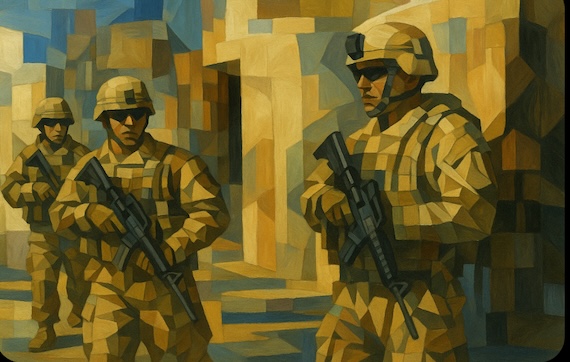Ann Arbor (Informed Comment) – Tara Copp at AP reports that the Trump administration will withdraw some of the 2000 troops now based in southeastern Syria. Some 600 will come out, leaving about 1400. The US has 8 small bases there and will close 3 of them.
According to the UAE press which draws on in part on the NYT, the move reflected the changed political situation in the country, given the fall of the Assad regime last fall and the accession of a new, fundamentalist Sunni Arab government hostile to Iran and the Lebanese Hezbollah. Further withdrawals are possible, though the Pentagon hopes to keep at least 500 troops in the theater. Apparently Trump himself would like to get all US troops out of the country. He had wanted to do this in his first term, but met opposition from the Pentagon, and his Secretary of Defense, James Mattis, resigned over the issue.
The legality of the US troop presence in Syria is questionable. The Obama administration inserted them on the pretext of fighting ISIL, claiming it was a self-defense move for the United States. Their remit was three-fold, to support the Kurdish allies of the United States in their continued access to Syrian petroleum, to ensure no resurgence of ISIL or ISIS, and to block Iranian weapons shipments through Iraq and Syria to Lebanon’s Hezbollah. While the al-Assad government did not want the US bases on its soil, it is unclear how the new Sunni fundamentalist government of al-Shara feels about it.
The Iran strategy seems no longer necessary, since the ayatollahs have lost their ally in Damascus and the new government is deeply hostile to the Islamic Republic of Iran.
The Kurdish forces have signed an agreement with fundamentalist leader Ahmad al-Shara to be integrated into the national army. The Kurds, who were key to the US defeat of ISIL, do hope that the US will continue to protect them from the Turkish military, which view them as terrorists. In his first term, Trump greenlighted an attack by Turkish leader Tayyip Erdogan on Kurdish territory in northern Syria.
There remain, however, concerns about an ISIL comeback. Trump administration cuts to foreign aid have left the thousands of ISIL prisoners in Kurdish custody desperate, and local actors may not have the wherewithal to keep ISIL fighters behind bars.

“Special Operations,” Digital, Midjourney / ChatGPT, 2025
Meanwhile, Mahmoud Nawfal at Elbalad reports that Syrian President Ahmad al-Shara flew to Doha for a three-way meeting with Qatari Emir Sheikh Tamim Al Thani and Iraqi Prime Minister Mohammad Shiya’ al-Sudani. Al-Sudani had earlier been very critical of al-Shara’s Sunni fundamentalist government, but the two appear to have found some common ground during this visit.
Both are afraid of a reemergence of ISIL, a rival to al-Shara and a bitter enemy to the Shiites of Iraq. With the US drawing down its presence, only close cooperation between Damascus and Baghdad can hope to keep a lid on the notorious terrorist organization that terrorized millions in the years 2014-2018.
Both Syria and Iraq, moreover, are threatened by the illegal Israeli occupation of a wide swath of Syria in the wake of the establishment of the new, fundamentalist government.
Al-Sudani made a plea for the maintenance of the Shiite shrines and holy places in Syria, including Sayyidah Zaynab, where many Iraqi Shiite refugees used to live a decade ago.
Iraqi Shiite militias had allied with the al-Assad government against the forces of Al-Shara during the Syrian Civil War, so there is bad blood and a lot of reconciliation work to do. Qatar’s mediation is typical of the small, gas-rich nation, which has played a key role in several peace deals in the region.


 © 2026 All Rights Reserved
© 2026 All Rights Reserved